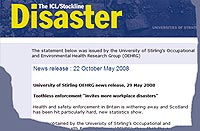Toothless Enforcement Increases Risk Of Workplace Disasters
Health and safety enforcement in Britain is withering away and Scotland has been hit particularly hard, new statistics show.
 Figures obtained by the University of Stirling’s Occupational and Environmental Health Research Group (OEHRG) show that the number of people employed by the workplace safety enforcement body the Health and Safety Executive (HSE) has dropped by over 11 per cent in just 5 years.
Figures obtained by the University of Stirling’s Occupational and Environmental Health Research Group (OEHRG) show that the number of people employed by the workplace safety enforcement body the Health and Safety Executive (HSE) has dropped by over 11 per cent in just 5 years.
In Scotland, however, the fall is more dramatic still with numbers employed dropping year on year from 2003/4 when the figure was 304 full-time equivalents (FTEs) down to just 264 in April 2008, a fall of over 13 per cent.
The number of posts lost at the safety watchdog covering Scotland’s key industries are more dramatic still. Frontline inspectors covering factories and agriculture have dropped by over 16 per cent. Offshore inspectors are down by 20 per cent and only one inspector covers all of Scotland’s quarrying industry. Quarrying is the most hazardous land based occupation in the UK.
OEHRG senior researcher Tommy Gorman commented:“Britain’s largest industrial tragedy in a generation took place in Scotland in 2004. However since the ICL Stockline factory blast which killed nine and injured dozens more, HSE staffing in Scotland has fallen year on year.
“It is important the ICL/Stockline enquiry thoroughly investigates the regulatory framework and enforcement practices of agencies such as the HSE and fire brigade responsible for oversight of the industries where major health and safety disasters occur”.
Professor Rory O’Neill of OHREG added: “It’s not just the numbers of inspectors that is crucial. It’s what those inspectors are allowed to do – HSE is a watchdog whose teeth have been pulled.
“The government has embraced every successive business-friendly recommendation to reduce inspection and take a more advisory light-touch role, yet ignored repeated warnings from UK Select Committees that there is a desperate need for greater enforcement and harsher penalties for health and safety offences.”
He added that “there is no longer a functioning deterrent to safety crimes. Even in a good year, only one on 30 fatal or serious injuries in Scotland will even be considered for prosecution.”
According to Professor Andrew Watterson, head of OHERG: “We need a doubling of the size of the enforcement staff in Scotland, better right for trade union safety reps - including roving representatives - to stop the job as HSE inspectors are so few in numbers. We also need effective enforcement, including a realistic expectation of a jail term, for those committing egregious occupational health and safety offences.
“This needs to be linked to a properly resourced Scottish Hazards Centre where any employee can obtain independent advice about the risk they face in the workplace”.
Bodies such as the STUC and its health and safety specialist, Ian Tasker, support moves for a stronger inspectorate, stronger enforcement and more rights for trade unionists to protect them from the serious hazards at work that exist in many Scottish workplaces.
Source: University of Sterling